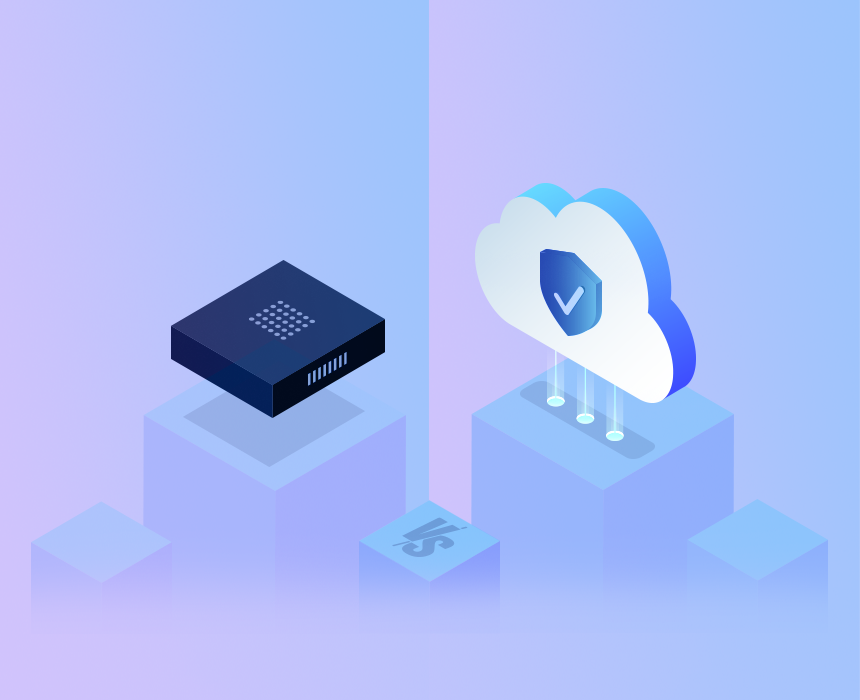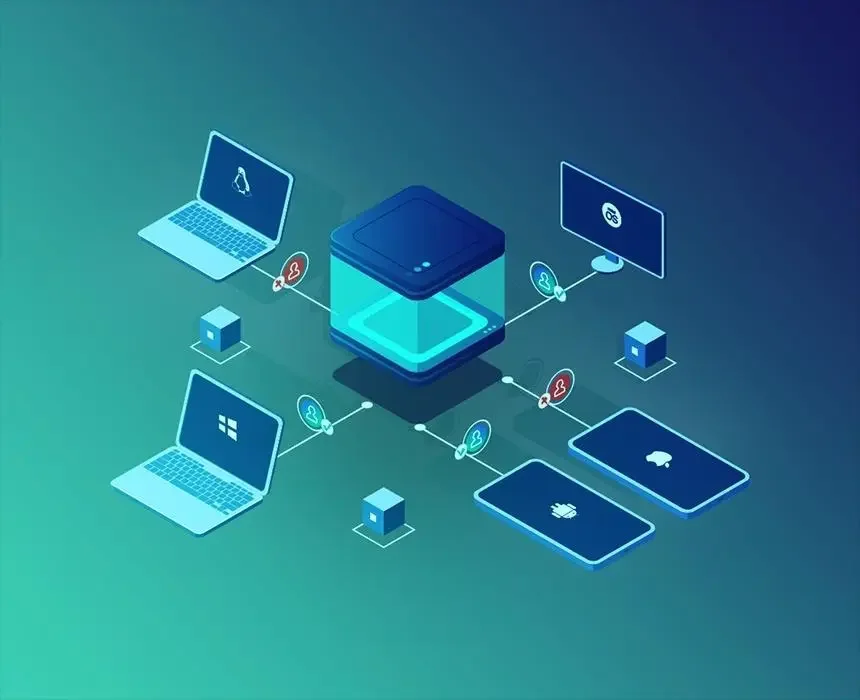
The speed, efficiency, and reliability of the cloud have prompted numerous services to base their infrastructure on the cloud. Virtual Private Network (VPN) services are no exception. Now, VPN-as-a-Service providers are leveraging the capabilities of the cloud to enable simple and easy cloud VPN setup. What exactly is a cloud VPN, and why do you need one? Let’s find out.
First, let’s look at what a cloud VPN is.
A VPN is a solution that provides a secure connection to its users by generating a private network connection within a public network (such as the Internet). A cloud VPN solution is simply a VPN with a cloud-based infrastructure. Cloud hosting gives it all the advantages of the cloud including scalability, cost-effectiveness, etc.
Apart from cloud hosting, a VPN server can also be hosted on-premise. This is commonly referred to as a traditional VPN and but many are shifting to VPN on the cloud. We will show you why in the next section.
Currently, it is nearly impossible for businesses to actively compete without having cloud-based solutions. Traditionally business VPN solutions have played a crucial role in ensuring privacy and data security for enterprises within their network. But, when it comes to accessing cloud resources, traditional VPNs experience chokepoints because traditional VPN devices are not the most efficient when it comes to effectively handling cloud VPN traffic.
A cloud VPN solution, on the other hand, solves such problems while reducing the effort compared to maintaining on-premise VPN servers. It has higher scalability to meet demands when they arise. It also allows users to set up VPN servers anywhere in the world since cloud providers usually have data centers distributed globally. This is extremely important in this age where enterprises are employing more remote workers, spread throughout the world.
Although cloud VPN services are typically associated with businesses, it is wise to get one for yourself or your family as well. Let’s say you’re traveling and you need to do some mobile banking. Connecting to the airport's public Wi-Fi places your passwords at risk. With a VPN server setup for yourself and your family, you can safely access your data on the move, that too from a VPN server only shared between people you know.
Now that you know what a cloud VPN is and why you need one, let’s look at how it works.
A cloud VPN strengthens the security of your private or business while maintaining safe accessibility.
To add an extra layer of security and minimize network latency, a cloud VPN securely connects users via an IPsec or OpenVPN connection. This is a much more secure option compared to public connections.
With site-to-site tunneling a company's on-prem LAN can be connected to a VPN server or another local network in a branch office, enabling easy and secured access to business network resources as one single network.
Remote users can download VPN client software on their devices and securely access their company's network when they are on the move or working from home.
Cloud VPN is secure because data in transit is always encrypted. This way, even if the data is intercepted by a cyber criminal, it will be useless to them because they will fail to make meaning out of encrypted data.
Instead of being implemented as network appliances, cloud VPNs are deployed as cloud-based solutions. Just like there are different types of cloud-based infrastructure, (such as IaaS, SaaS, etc), there are different cloud VPN offerings as well. This is where the term VPN-as-a-service (VPNaaS) comes from.
Depending on the purpose, there are 2 types of cloud VPN offerings:
Remote access - to securely connect remote workers to the enterprise network.
Site-to-site connections - to connect on-premises networks and cloud networks. A physical appliance VPN appliance connected to a virtualized cloud endpoint is deployed on-site. This appliance establishes an encrypted tunnel that secures all traffic between on-prem and cloud networks.
A cloud VPN enables users to leverage the advantages of utilizing cloud infrastructure. The main benefits of a cloud VPN include:
Organizations are increasingly moving their operations to the cloud and becoming reliant on it. This automatically rules out traditional VPNs which tend to route all traffic through the company’s network. Consequently, increasing the latency for cloud-based resources. By providing direct access, cloud VPN services ensure this does not happen. In addition, most cloud VPNs provide solutions integrated with numerous cloud resources that users can utilize hassle-free.
A cloud VPN does not place limits on the maximum number of connections to it or the maximum bandwidth it can support. When more users join the network and when more bandwidth is required, it can be added seamlessly. Traditional VPNs on the other hand are not able to adjust bandwidth according to demand and place a limit on the maximum number of users.
Cloud VPNs are built to be highly adaptable to the emerging needs of a business. Configuring a Cloud VPN is a lot easier than a traditional VPN. Users can alter their requirements on a graphical user interface and the cloud VPN provider will handle the rest at the back end.
Cloud technologies have held a reputation for being cost-effective, and cloud VPNs are not an exception. It is way cheaper to deploy a cloud VPN since all the charges are bundled in the usage fee plan than to deploy, maintain, and upgrade VPN hardware as it is with traditional VPNs.
With the growing number of remote workers globally and reliance on cloud technologies, it no longer makes sense to have a traditional VPN service for your organization. You need a cloud-based VPN capable of supporting your organization’s ever-changing needs.
So if you’re looking for an efficient yet cost-effective cloud VPN solution for your organization, UTunnel VPN will prove you to be an excellent choice.
UTunnel VPN is a well-crafted tool built to enable businesses to effortlessly deploy a VPN solution on the cloud. It gives you the option to have a dedicated server for your business cloud VPN. UTunnel VPN offers a lot of capabilities in its core features including:
Needless to say, there are other cloud VPN solutions currently on the market. So what makes UTunnel VPN stand out?
It is an ideal VPN solution for businesses (SMBs) as a result of its versatility, ease of use, and breadth of features.
Primarily, UTunnel VPN is a cloud VPN for business, but you can also set up a VPN for personal use and add family and friends to your plan to reap privacy and data security when browsing the internet.
Yes, you will have a static IP with a cloud VPN. Your cloud provider will provide you with a static IP address.
Yes, it is if you use many cloud-based applications at your company. This is generally the case with most modern companies today. In addition to offering everything a traditional VPN offers, a cloud VPN also delivers flexibility, cost-effectiveness, global accessibility, and direct cloud access.
Tunneling creates an encrypted link separated from the public network, usually the Internet. User data is encrypted into packets that are sent through this link created over the network connection.
The network endpoints are the essential differentiator between IPsec and SSL protocols. IPSec connections are used by cloud VPNs to securely link remote users to an entire network. Within a network, the SSL protocol only allows access to specified systems or applications. It is the web browser and server protocol. Furthermore, while SSL is a single protocol, IPsec is a framework of protocols.

Despite the common belief that cyber-attacks are always focused on medium to large businesses and small businesses are spared from cyber-attacks owing to their comparatively smaller fortunes, it is t…
30 August 2023
In today's interconnected digital landscape, where businesses increasingly rely on cloud infrastructures to store their network resources and applications, ensuring data security has become param…
20 July 2023
Businesses today are operated, regulated, and grown via data and other online resources such as servers. For a business to do this optimally, these resources have to be secured. A fundamental part of…
29 July 2022